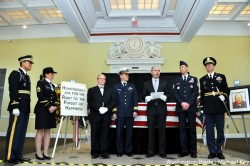Local
Kameny’s death is local LGBT story of the year
Activists, public officials mourn loss of pioneering figure


Activist Frank Kameny died on Oct. 11, which is National Coming Out Day. (Washington Blade file photo by Michael Key)
Local and national public officials joined D.C.’s LGBT community in remembering the life and accomplishments of veteran gay rights leader Frank Kameny at memorial events this fall following Kameny’s death in Washington on Oct. 11.
Kameny, 86, is credited with being one of the leading strategists for the early gay rights movement beginning at least a decade before the 1969 Stonewall Riots in New York’s Greenwich Village, which historians consider the starting point for the modern LGBT rights movement.
LGBT movement leaders who knew Kameny say he laid the groundwork for the movement to advance following the Stonewall Riots and going forward, playing a pivotal role in advancing the cause of LGBT equality over a period of 50 years.
“Frank Kameny is one of the most significant figures in the history of the American gay rights movement,” said D.C. Mayor Vincent Gray at a Nov. 3 memorial viewing for Kameny at the city’s Carnegie Library building.
Gray was joined at the memorial viewing by several members of the D.C. City Council, including gay Council members David Catania (I-At-Large) and Jim Graham (D-Ward 1); D.C. Police Chief Cathy Lanier and D.C. Congressional Delegate Eleanor Holmes Norton (D).
A gay Air Force sergeant and four gay military veterans in full dress uniform, including gay former Army Lt. Dan Choi, joined Catania and Graham as pallbearers, carrying an American flag-draped coffin bearing Kameny’s remains into the building’s ceremonial atrium.
Organizers of the ceremony, led by local activists and Kameny friends Bob Witeck and Charles Frances, said the flag-draped coffin honored Kameny, among other things, for his service in the Army in World War II, where he served in combat in Europe.
Among other accomplishments, activists said Kameny became the first known gay person to publicly challenge an act of anti-gay discrimination when he sued the federal government for firing him from his job in 1957 as a civilian astronomer with the U.S. Army Map Service because of his sexual orientation.
After losing his case in the lower courts, Kameny set yet another precedent by bringing the first known gay-related case before the U.S. Supreme Court. The high court upheld a lower court ruling against Kameny and refused to take his case on the merits.
But in a 61-page legal brief petitioning the court to take the case, which Kameny wrote, he pulled together what some gay historians consider a gay rights manifesto that became the underpinning of the LGBT rights movement for years to come.
In a second memorial for Kameny held Nov. 15 at the Cannon House Office Building on Capitol Hill, several public officials, including members of Congress and an Obama administration official, cited Kameny’s role as a national civil rights figure.
“His life cleared the path that I and countless others followed into public service,” said John Berry, director of the U.S. Office of Personnel Management, who in 2009 became the Obama administration’s highest-level openly gay appointee.
“His unrelenting and unceasing fight for gay rights enabled other Americans to step out of the closet and into the full light of equality,” Berry told the gathering. “But most importantly, his long battle and eventual triumphs show the miracles that one person wrought upon the world.”
Kameny’s friends and colleagues said they were saddened over his passing but uplifted in knowing that Kameny lived to see many of the LGBT rights initiatives he fought for come to fruition, including an apology by the government, more than 50 years later, for its decision to fire him.
Kameny also lived to see the Library of Congress acquire more than 50,000 documents from his gay rights-related papers collection; the Smithsonian Institution’s American History Museum acquire and display picket signs he and his fellow activists carried in gay rights protests in the 1960s; the D.C. government’s naming a section of 17th Street, N.W., near Dupont Circle as Frank Kameny Way; and a decision by city officials to designate Kameny’s house as an historic landmark.
Arrangements are being made for a burial service for Kameny’s ashes at D.C.’s historic Congressional Cemetery in the spring.
Virginia
Walkinshaw wins Democratic primary in Va. 11th Congressional District
Special election winner will succeed Gerry Connolly

On Saturday, Fairfax County Supervisor James Walkinshaw won the Democratic primary for the special election that will determine who will represent Virginia’s 11th Congressional District.
The special election is being held following the death of the late Congressman Gerry Connolly, who represented the district from 2008 until 2024, when he announced his retirement, and subsequently passed away from cancer in May.
Walkinshaw is not unknown to Virginia’s 11th District — he has served on the Fairfax County Board of Supervisors since 2020 and had served as Connolly’s chief of staff from 2009 to 2019. Before he passed away, Connolly had endorsed Walkinshaw to take his place, claiming that choosing Walkinshaw to be his chief of staff was “one of the best decisions I ever made.”
The Democratic nominee has run his campaign on mitigating Trump’s “dangerous” agenda of dismantling the federal bureaucracy, which in the district is a major issue as many of the district’s residents are federal employees and contractors.
“I’m honored and humbled to have earned the Democratic nomination for the district I’ve spent my career serving,” Walkinshaw said on X. “This victory was powered by neighbors, volunteers, and supporters who believe in protecting our democracy, defending our freedoms, and delivering for working families.”
In addition to protecting federal workers, Walkinshaw has a long list of progressive priorities — some of which include creating affordable housing, reducing gun violence, expanding immigrant protections, and “advancing equality for all” by adding sexual orientation and gender identity to the Fair Housing Act.
Various democratic PACs contributed more than $2 million to Walkinshaw’s ad campaigns, much of which touted his connection to Connolly.
Walkinshaw will face Republican Stewart Whitson in the special election in September, where he is the likely favorite to win.
Maryland
LGBTQ suicide prevention hotline option is going away. Here’s where else to go in Md.
Changes will take effect July 17

By ANNA RUBENSTEIN | The national suicide prevention hotline will no longer offer specialized support to LGBTQ people, starting July 17, the Trump administration announced last week.
Dialing the hotline at 988 will still be available for crisis support. But callers will no longer be able to reach specific LGBTQ services by pressing Option 3. The change worries advocates because their data shows the LGBTQ community has a disproportionally high suicide rate.
Even after the option ends, here’s how to receive tailored support if you’re in Maryland.
The rest of this article can be found on the Baltimore Banner’s website.
Maryland
Silver Spring holds annual Pride In The Plaza
‘Today means inclusion. It means to build resilience’

Silver Spring’s annual Pride in the Plaza event took place on Sunday to celebrate the LGBTQ community and emphasize inclusion and resilience.
“Today means inclusion. It means to build resilience, love,” Robyn Woods, program and outreach director for Live In Your Truth, which organized the event, said. “I mean, just being surrounded by the community and so many great entrepreneurs, business owners, and just being a part of this whole rainbow coalition that we call the LGBTQIA to be about.”
With the event being her first time organizing for Live In Your Truth, Woods said she felt emotional to see the support and love at the event.
“Some people (are) bringing out their children, their babies, their grandparents,” Woods said. “It’s a lot more allies here than anything else. That type of support to me means so much more than just support from my community; just outside support, inside support, so much support around it, so much love. Everyone’s smiling outside, helping each other.”
Attendees of the event were able to head over to the Family Fun Zone, an air-conditioned Pride Cool Down Lounge, or watch live drag performances in the main stage area.
Along with entertainment and a shaved-ice stand, rows of information tables stood along the plaza, including FreeState Justice, the Washington Spirit, Trans Maryland, Moco Pride Center, and the Heartwood Program, an organization that offers support, therapy, education, and resources to the LGBTQ community.
“I want people to know about our services, and I love what we have to offer,” Jessica Simon, psychotherapist for Heartwood Program’s Gender Wellness Clinic, said. “I (also) want to be part of a celebration with the community, and so it feels good to be here with other people who have something they want to give to the community.”
She added that within today’s political climate, to which she called an “antidote to shame,” it’s important to be celebrating Pride.
“There’s a lot of demonization of LGBTQI people,” Siena Iacuvazzi, facilitator for Maryland Trans Unity, said. “(Pride) is part of the healing process.”
Iacuvazzi said she was taught to be ashamed of who she was growing up, but being a part of a community helped her flourish in the future.
“I was taught how to hate myself. I was taught that I was an abomination to God,” she said. “But being a community is like understanding that there are people who have experienced the same thing, and they’re flourishing. They’re flourishing because they’re willing to stand up for themselves as human beings and discover themselves and understand what’s true for themselves.”
She added that Pride allows for a mutual understanding to take place.
“It’s more of a sense of belonging … and just taking that home and understanding you’re not alone,” Iacuvazzi said. “We’re each taking our own journey — we’re not putting that on each other. It’s just walking away with a sense of belonging and humanity.”
Similar to Iacuvazzi, Woods said she hopes attendees’ biggest takeaways would be family, fun, resilience, and pride.
“Being proud of yourself, being happy for who you are, and representation and how much it matters,” she continued. “And I think all these young people that are walking around here get to see versions of themselves, but older. They get to see so many different lesbian, gay, bisexual, pansexual people that are successful, that are showing love, that care, and it’s not how we’re portrayed in the media. It’s lovely to see it out here. (It’s) like we’re one big old, happy family.”
-

 U.S. Supreme Court4 days ago
U.S. Supreme Court4 days agoSupreme Court upholds ACA rule that makes PrEP, other preventative care free
-

 U.S. Supreme Court4 days ago
U.S. Supreme Court4 days agoSupreme Court rules parents must have option to opt children out of LGBTQ-specific lessons
-

 District of Columbia5 days ago
District of Columbia5 days agoMan sentenced to 15 years in prison for drug deal that killed two DC gay men
-

 Federal Government5 days ago
Federal Government5 days agoWhite House finds Calif. violated Title IX by allowing trans athletes in school sports







